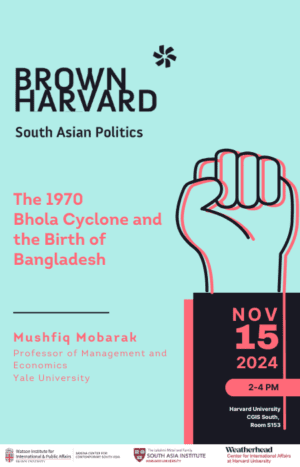 On Friday, November 15, the Mittal Institute will hold its last fall installment of the Joint Seminar on South Asian Politics series, featuring Mushfiq Mobarak, Jerome Kasoff ’54 Professor of Management and Economics at Yale University, with an eyewitness account from Martha Chen, Mittal Institute Steering Committee member. Mobarak’s talk, “The 1970 Bhola Cyclone and the Birth of Bangladesh,” will explore research from a new working paper co-authored by Prof. Sultan Mehmood, Assistant Professor of Economics at the New Economic School of Moscow and a research affiliate at the Harvard Law School’s Program in Islamic Law. Their work explores the political impacts of one of the deadliest natural disasters ever recorded, the Bhola Cyclone that struck East Pakistan (now Bangladesh) and killed 300,000 to 500,000 people. They provide empirical evidence that the cyclone’s devastation and the Pakistani government’s “callous response” to it were instrumental in galvanizing support for an independence movement.
On Friday, November 15, the Mittal Institute will hold its last fall installment of the Joint Seminar on South Asian Politics series, featuring Mushfiq Mobarak, Jerome Kasoff ’54 Professor of Management and Economics at Yale University, with an eyewitness account from Martha Chen, Mittal Institute Steering Committee member. Mobarak’s talk, “The 1970 Bhola Cyclone and the Birth of Bangladesh,” will explore research from a new working paper co-authored by Prof. Sultan Mehmood, Assistant Professor of Economics at the New Economic School of Moscow and a research affiliate at the Harvard Law School’s Program in Islamic Law. Their work explores the political impacts of one of the deadliest natural disasters ever recorded, the Bhola Cyclone that struck East Pakistan (now Bangladesh) and killed 300,000 to 500,000 people. They provide empirical evidence that the cyclone’s devastation and the Pakistani government’s “callous response” to it were instrumental in galvanizing support for an independence movement.
We spoke to Professors Mobarak and Mehmood for more insight into their paper, and a preview of the talk.
Mittal Institute: Thank you both for speaking with us! What are some of your research interests, and how did you first begin studying the Bhola cyclone’s political implications?
Mushfiq Mobarak and Sultan Mehmood: With a team that includes voices from both Pakistan and Bangladesh, we have a distinctive perspective on a historical event that resonates deeply in both countries. Our background in economics empowers us to engage with a fundamental question: why do some independence movements succeed while others falter? The case of Bangladesh, along with the rich data at our disposal, presents us with a unique opportunity to shed light on this critical scientific question and contribute to the broader understanding of nation-building.

Left image: Mushfiq Mobarak; Right image: Sultan Mehmood.
Mittal Institute: The coastal areas around former East Pakistan were always vulnerable to cyclones, with roughly two per year. Why was the Bhola cycle different?
Mushfiq Mobarak and Sultan Mehmood: The Bhola cyclone of 1970 was significantly different from previous cyclones that affected the coastal areas around former East Pakistan (present-day Bangladesh) for two main reasons:
Magnitude and Impact: The Bhola cyclone was one of the deadliest tropical cyclones ever recorded, causing immense destruction. It struck on November 12, 1970, with wind speeds estimated at 115 mph (185 km/h) and a storm surge that inundated coastal areas and even spread inside then East-Pakistan, resulting in the deaths of an estimated 300,000 to 500,000 people. This scale of devastation far exceeded that of typical cyclones, which usually resulted in fewer casualties.
Timing and Preparation: The cyclone hit during a period of political tension and lack of preparedness. The population was largely unaware of the impending disaster due to inadequate warning systems and communication failures. The government’s response was criticized for being slow and ineffective, exacerbating the cyclone’s impact. This lack of preparation contributed to the high casualty rate, distinguishing Bhola from other cyclones that had occurred in the region.
The Bhola cyclone was unique due to its unprecedented scale, the lack of preparedness and effective response, and its profound socio-political consequences that we are able to document. These factors combined to make it a pivotal event in the history of South Asia.
Mittal Institute: Post disaster, what was the Pakistan government’s response like?
Mushfiq Mobarak and Sultan Mehmood: The Pakistani government’s response to the Bhola cyclone was widely criticized for its inadequacy and lack of urgency. Initially, there was a significant delay in mobilizing relief efforts, which contributed to the suffering of affected communities. The government’s failure to provide timely aid and support highlighted systemic issues in disaster management and communication.
Mittal Institute: Can you explain how the cyclone impacted the elections? Was there already an existing demand for independence?
Mushfiq Mobarak and Sultan Mehmood: The Bhola cyclone likely created a focal point for discontent in East Pakistan, amplifying existing demands for independence. There was already language issues, as well as the United Front coalition in East Pakistan. The Bhola cyclone provided the natural impetus for Awami league to really get a large majority and then unite and fight for independence.
The Bhola cyclone provided the natural impetus for Awami league to really get a large majority and then unite and fight for independence.
Mittal Institute: What is something you hope the audience takes away from your talk?
Mushfiq Mobarak and Sultan Mehmood: Natural disasters can have profound political consequences, not just economic ones. As climate change increases the frequency and severity of such disasters, we must recognize the significant political costs associated with these events, in addition to their immediate economic effects. This awareness is crucial for effective governance and disaster response in the face of a changing climate.
☆ The views represented herein are those of the interview subject and do not necessarily reflect the views of the Mittal Institute, its staff, or its steering committee.
